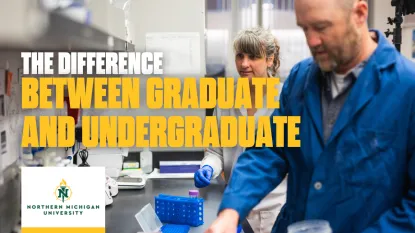
THE DIFFERENCE BETWEEN GRADUATE AND UNDERGRADUATE
If you’ve never talked at length with someone who attended graduate school, chances are you don’t know about all the ways it is different from undergrad. And even if you do have some knowledge of a particular program, it doesn’t necessarily mean that’s how all programs are. The NMU College of Graduate Studies & Research (GS&R) offers workshops on the application process throughout the year. We are also available to advise students interested in going on to grad school anywhere. Let’s take a look at how graduate school is different from undergraduate.
Read the more below:
Graduate Vs. Undergraduate
With undergraduate school, you are usually pursuing your first bachelor’s degree. Undergraduate school also involves associate degrees and certificates. Students can also start or take classes at a community college and transfer credits to a larger institution.
Graduate school is much more focused and you can go for a number of different types of degrees, including a PhD (or doctoral degree), a Master’s degree, or a graduate certificate. Schools that train lawyers and medical or dental are typically referred to as professional schools. Graduate schools and professional schools are almost always attached to an undergraduate university, but their application and admissions processes are usually completely separate and different.
Applications
Applications to grad programs are a bit more complicated than undergrad and they aren’t all the same so it’s super important to do your homework. You may submit one application to the graduate school that also contains the information the academic department needs to review your application for admission. Or you might have to submit an application to the grad school and then a separate application to the department. And yes, they probably both have separate fees, BUT if you are experiencing financial hardship, you can always ask if there are application fee waivers available.
Applications open in early September and deadlines range from December 1 to mid March. If you’re applying to multiple programs, you’re going to need to be very organized. You should really know where you’re going to apply before the fall semester of your senior year. This whole timeline is shifted ahead for medical school and law school. For graduate school applicants who receive multiple offers, keep in mind that you have until April 15 to make a decision about where you are going to attend. For specific tips on preparing your application, check out the GS&R application help page.
Programs
If you’re applying to a program that’s research intensive (a PhD, or a thesis-based master’s) then you’ll probably need to identify a faculty member who will work with you ahead of time. Professional master’s degree programs (MBA, MSW, MPH, etc.) don’t require this. For research based programs, start at the webpage of the program you’re interested in, and then look for a list of their faculty. Reach out early on in the semester before you plan to graduate (fall of your senior year) to make connections. If you’re applying to competitive programs, this process should really start during your Junior year of undergrad.
Undergraduate courses and programs are usually more generalized, and you will more than likely have to take general education courses that are unrelated to your major or concentration. While courses may touch on specific subjects or topics, overall you will take a wide variety of courses that cover many topics.
Funding
Another thing to think about with graduate school is funding. Depending on the school and the program, there are varying levels of money available to support graduate students. This support is typically called a graduate assistantship. And, again depending on the institution, that assistantship comes with different benefits. Sometimes it’s just tuition, sometimes just a stipend, other times both, and some even come with health insurance. You’re usually not going to get rich off the stipend (and may have to take loans out to cover the gaps for cost of living) but it does defray the cost of earning a graduate degree, which can really bump up your earning potential. Almost all PhD programs will come with funding in the form of a research or teaching assistantship. Some master’s programs will too (though usually only at institutions that don’t also offer PhDs.) The other kind of assistantship is the graduate administrative assistantship. That’s when you are hired by a campus office to perform administrative duties for that office. You’ll want to look into what types of funding are available to applicants for which programs at each institution you’re applying to.
Undergraduates are able to utilize some of the same things, such as financial aid, however, there usually aren’t undergraduate assistantships. Scholarships, loans and on-campus jobs are your best options to gain additional funding.
Enrollment - credit load
Once you’re accepted to a graduate program, the enrollment process is pretty much the same, although you won’t be enrolled in as many credit hours. A graduate student is usually considered full time when they’re enrolled in at least 8 credit hours. That’s because those hours carry more weight. Expect to spend a lot more time reading for your grad courses. You’ll also be responsible for more papers. This, combined with the fact that generally you get quite a bit less direction as a graduate student than you do as an undergrad, makes pursuing a graduate degree quite the challenge.
But it’s not all bad. Less direction means more autonomy, so you’re freer to pursue the knowledge you’re actually interested in. Fun! The other difference is that your relationship with faculty starts to change a bit. As you learn more and grow in your field, you’re narrowing the knowledge gap between you and your professors, which often leads to a more relaxed and collegial relationship.
Credit load for undergrad programs can vary by institution, but generally full-time is taking 12 credits or more, a normal credit load is 16 credits and the most you can take is 20 credits. Again, things vary depending on the university, but at NMU, most undergrad courses are 4 credits each, so a normal load is four, four credit classes totaling 16 credits. Some courses may have 3 credits, but generally 4 is the norm.
Duration
Graduate programs also vary in structure and duration. The average time it took to finish a Ph.D. in 2020 was 5.8 years but that varies depending on your field. On the short end are Business and Engineering with an average of 5 years to completion. And on the long end are programs in fields like Anthropology (7.2 years) and Sociology (6.8 years.) Master’s degree programs also vary in format and duration but last only between 1-3 years. The main determinant of how long it takes you to finish your graduate degree is your thesis or dissertation.
In contrast, most undergraduate degrees take 3-4 years to complete, depending on if you have credit from transferring or from high school. It is normal for undergrad to take longer than 4 years, especially if you change your major, but generally it is structured to be able to be done in 4 years. If you’re funding your undergraduate degree with Federal loans or Pell grant, be aware of the time/credit limits on that funding. If you take more than 4 years, you could run into issues with continued funding.
Research/Committees
The main component of your graduate program will be the scholarship you engage in. The research or scholarly work. That moment when you shift from becoming a knowledge consumer to a knowledge creator. Hooray! Well, that can take some doing and it involves LOTS of reading, lots of thesis/dissertation proposal drafts, and lots of time either in the lab/field/studio or engaging with the literature of your field. At the same time as you put your thesis/dissertation plan together, you will select a committee. This is a group of faculty who are there as resources to help with different aspects of your research. They are also the folks who you defend your work to when it’s finished and they get to decide when you’re done. So…choosing a topic and a committee are very important steps and should be weighed carefully.
Institutions like NMU also offer research for undergrads! Although the process is different. Your main focus won’t be research if you are in undergraduate school, as you are a student first and a researcher second. However, you are still able to assist, and it can be excellent experience if you are considering continuing your education beyond the undergrad level.
Social
On the social side of grad school, you’re likely to make strong connections with the other people in your program. It makes sense since you’re all there because you’re interested in the same sort of stuff. They’re your people! So, the outside of the classroom camaraderie can be an even bigger part of your graduate school experience than it was during undergrad. If your program is set up in such a way that you don’t automatically know and spend time with your cohort, then it’s a good idea to find a way to make those connections. Usually grad students live off campus and depending on the size of the city, you might not run into them often.
Graduate school often coincides with big things happening in your life like meeting a romantic partner or becoming a parent. Even when these life events are positive, they can impact the timeline of your graduate degree plans. So, it’s important to think carefully about the type of program you choose, and what your objectives are in earning a degree. Reach out to Graduate Studies & Research at NMU for help.
Undergraduates tend to be more involved on-campus with activities. It is also more likely that undergraduate students live on campus. Many students may have a job in addition to school, which can limit their availability. However, if you are working on campus at NMU, you can only work a maximum of 20 hours a week while taking classes. Regardless of being an undergrad or a graduate student, you should try to get involved as making connections is a great way to improve your personal and professional life.
Takeaway
There are many factors to consider when pursuing a degree, and whether to continue your education after your undergraduate degree. One of the most important is your future career goals. At Northern Michigan University, we offer unique and immersive higher education courses of study designed to help you get ready for your aims in life. To learn more about our programs, schedule an on-campus visit today! Reach out to the Admissions Office, or the Office of Graduate Studies & Research today to learn more!
